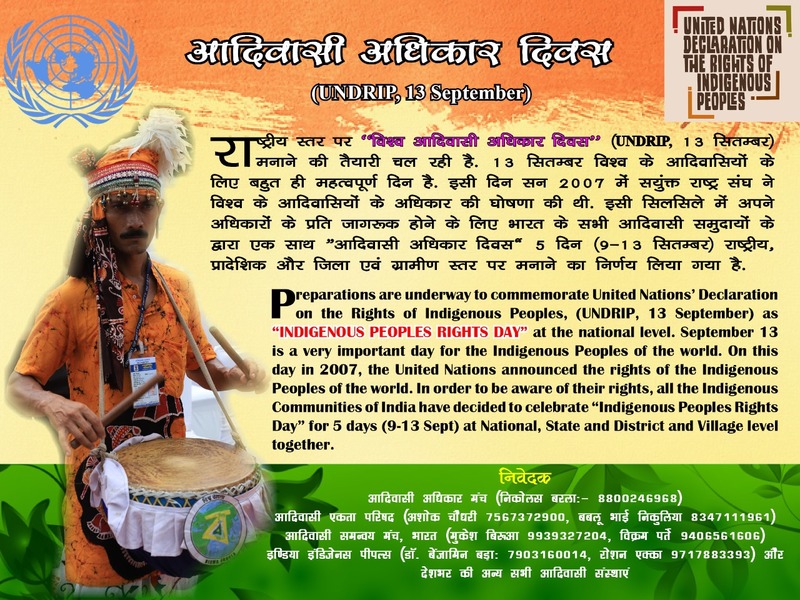
Indigenous Peoples’ Rights Day, India
India is a sub-continent with a large number of Indigenous communities. There are about 700 Indigenous Communities recognized by the government of India as Scheduled Tribes. But there are other indigenous communities like nomadic, semi-nomadic, pastoral and Particularly Vulnerable Tribal Groups (PVTGs) who also possess distintive cultures and patterns of life but they are not yet recognized by the government of India as Scheduled Tribes or Tribals.
The Pandemic happened to be a blessing in disguise when many Indigenous Community leaders in India decided to have a common observation of UNDRIP in all possible ways. The many other indigenous leaders and representatives were contacted across India and all of them expressed to connect together for the observation of UN Declaration on Rights of Indigenous Peoples, 2020. A round of online meetings and deliberations took place and the following plans were finalied.
The Indigenous Peoples in India will jointly commemorate United Nations’ Declaration on the Rights of Indigenous Peoples, (UNDRIP, 13 September) as “INDIGENOUS PEOPLES RIGHTS DAY” at the Regional, State, Local and National level. September 13 is a very important day for the Indigenous Peoples of the world. In order to be aware of their rights, all the Indigenous Communities of India have decided to celebrate “Indigenous Peoples Rights Day” for 5 days (September 9-13) together. The action plan to celebrate at National, State and District and Village level is as follows:
Final Schedule for National, State & Local Level Celebration of Adivasi Adhikar Diwas (UNDRIP), 2020
| Date | Themes and Topics | Resource Persons |
| 9th Sept. | 1. Background of 13th September 13 सितम्बर की पृष्ठभूमि
2. UNDRIP and it Articles आदिवासी अधिकारों पर संयुक्त राष्ट्र की घोषणा और उसके अनुच्छेद |
State/Zonal level Programme
|
| 10th Sept. | 1. Rights of Traditional Customary Practices पारंपरिक आदिवासी प्रथाओं के अधिकार 2. Customary Rights of Tribals & UNDRIP आदिवासियों के प्रथागत अधिकार और UNDRIP 3. Constitutional Rights for Tribals (5th & 6th Scheduled Areas, PESA Act, etc.) आदिवासियों के लिए संवैधानिक अधिकार (पांचवी और छठी अनुसूची क्षेत्र, पैसा कानून, इत्यादि) 4. Tribal Rights over Land in Scheduled Areas अनुसूचित क्षेत्रों में भूमि पर आदिवासी अधिकार | State/Zonal level Programme |
| 11th Sept. | 1. Rights for Employment & Business Opportunities रोजगार और व्यावसायिक अवसरों के अधिकार 2. Rights for Tribal Women & Children आदिवासी महिलाओं और बच्चों के लिए अधिकार 3. Right to Education & Indigenous Languages शिक्षा का अधिकार और आदिवासी भाषा Press Conference in each State and Districts प्रेस कान्फ्रेंस प्रत्येक राज्य और जिलों के लिये | State/Zonal level Programme |
| 12th Sept. | Historical Journey by Indigenous Peoples in achieving UNDRIP in UN Mechanism and on the efforts to get legislation in Canada to implement the Declaration | International Level Programme
Dr. Kenneth Deer, Mohawk Territory, Canada |
| Participation in governance. Structure and function of the Indian Treaty Council in realizing UNDRIP. | Dr. Andrea Carmen | |
| UNDRIP and Implementation of UNDRIP among Arctic Indigenous Peoples, Alaska. | Dr. Dalee Sambo Dorough | |
| Protection and revitalization of Language , Culture and Traditional knowledge of Indigenous Peoples by implementation of UNDRIP through UNESCO | Ms. Irmgarda Kasinskaite | |
| UNDRIP and its implementation among Member States in UN mechanism. | Mr. Alexey Tsykarev | |
| Indian constitution & UNDRIP: Future Course of Action in India.
|
Prof. Virginius Xaxa, | |
| 13th Sept. | 1. Environment Impact Assessment & Tribal Rights (Forest & Natural Resources) पर्यावरण प्रभाव आकलन और आदिवासी अधिकार (वन और प्राकृतिक संसाधन) 2. Right to Religion, Tribal Dharam Code & Census of Indiaधर्म का अधिकार आदिवासी धर्म कोड और जनगणना 4. Role of Ministry of Tribal Affairs, National & State Commission for Scheduled Tribes and Tribals of India अनुसूचित जनजाति मंत्रालय राष्ट्रीय और राज्य अनुसूचित जनजाति आयोग की भूमिका एवं भारत के आदिवासी | 1.Her Excellency Anusuiya Uikey 2. Hemant Soren Chief Minister, Jharkhand 3. Ravi Thakur, 4. Mukesh Birua 5.Shomona Khanna
6. Porlal Kharte 7. Omkar Singh Markam |
In Joint Collaboration with
- आदिवासी अधिकार मंच, आदिवासी समन्वय मंच, भारत, आदिवासी एकता परिषद्, सर्व आदिवासी समाज, छत्तीसगढ़, झारखण्ड जनाधिकार मंच, आदिवासी एकता मंच, ओड़िसा, राज्य मूलादिवासी वेदिके, कर्नाटक, Indigenous Peoples’ Forum, Odisha, आदिवासी महिला परिषद्, महाराष्ट्र, Nilgiri’s PVTGs Federation Ooty, Primitive Tribal Groups Andhra Pradesh, Adivasi Women’s Network and India Indigenous Peoples.
